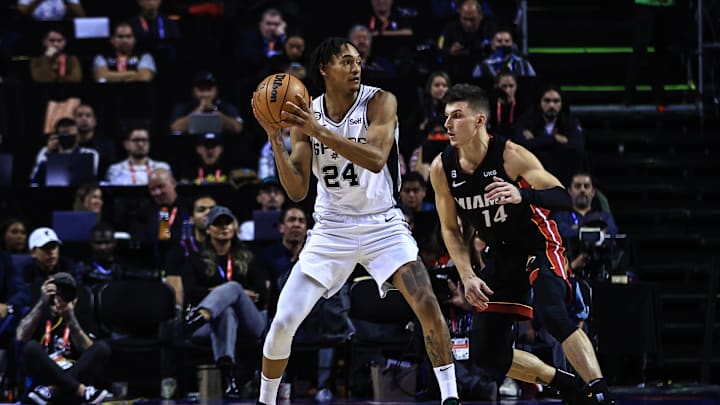Grading the extension for Devin Vassell
Evaluating this extension for Devin Vassell is a bit more subjective than it is for the Spurs, who are clear winners for agreeing to this extension and stretching it out for five seasons. If it's such a team-friendly deal, was Vassell wrong for signing it?
When a player agrees to a rookie extension, they are giving up both flexibility and upside. If Vassell takes another large step forward this season he could be a candidate for a maximum contract next summer. If things go poorly with his relationship with the Spurs, he could even take the bold choice to take the qualifying offer and walk elsewhere. Signing the extension eliminates both of those option, however likely or unlikely they are.
In return, Vassell locks up life-changing money. We put $146 million in context on the last slide, but it's still $146 million. Michael Jordan made $90 million in career salary. Manu Ginobili earned $130 million across his entire NBA career. That's a massive deal for a 23-year-old to sign.
It's also fair to note that players whose value doesn't show in the traditional box score have an uphill battle in negotiations. To his credit, Vassell took a leap last year and averaged 18.5 points per game, but for his career he's at 11.2 points per game, which is ninth in the draft class, behind names like Cole Anthony and Immanuel Quickley. He's 18th in win shares from playing on a rebuilding team.
If Vassell were to have a similar season to last year and then hit restricted free agency next summer, it's not a guarantee that he would make the same money. If something catastrophic were to happen in his personal life, or if he suffered a significant injury, not having a contract could put him in a poor financial situation. Miles Bridges sabotaged himself, but he also lost countless tens of millions compared to the contract extension that he turned down.
Given the touches likely available to Vassell this season, his career trajectory and the value of the position that he plays, he probably could have gone into next season betting on himself to take another step forward. Yet restricted free agency is a nasty game, and he could also have found himself squeezed. The security of this deal means something.
Even so, signing up for five years instead of four years seems like he didn't balance enough risk into the deal. A shorter contract would have put him back on the market sooner and potentially on a max or even supermax deal; if he explodes over the next few seasons he can't realistically increase his salary; he's stuck at an average of $29 million or so.
This was a good deal, a lot of money, and it eliminates the downside risk and the need to negotiate next summer. If Vassell continues to grow, however, he will be massively underpaid by the end of the contract.
Grade: B
manual
